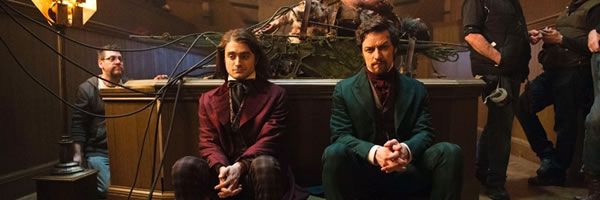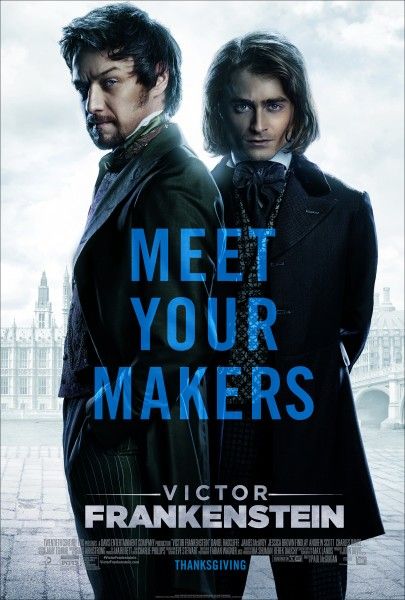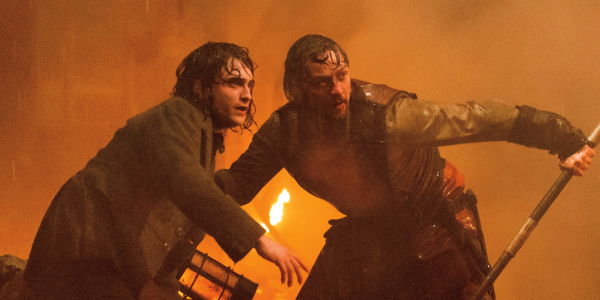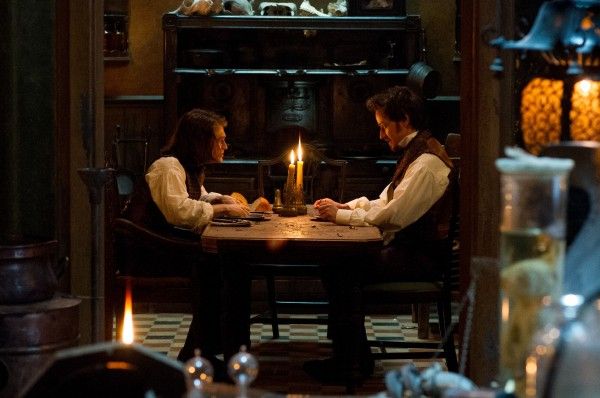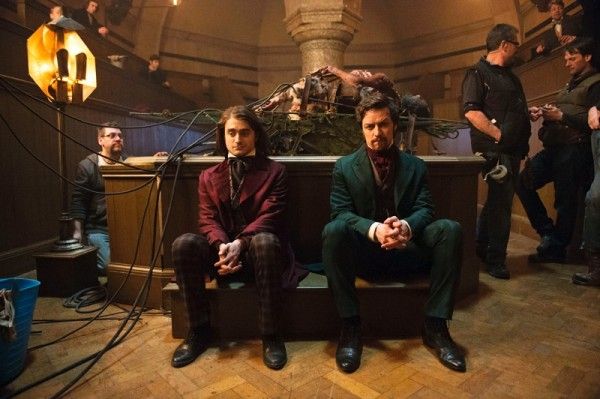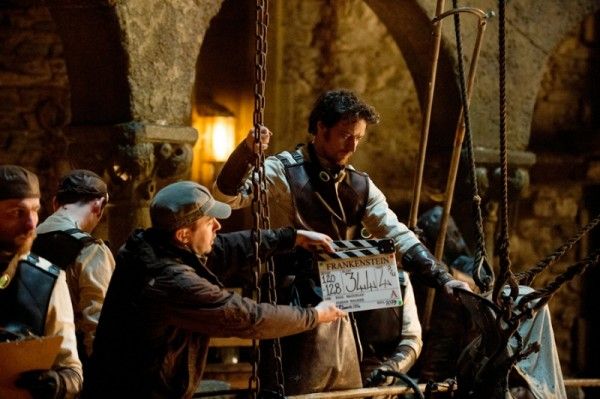Victor Frankenstein attempts to find a new angle into the familiar Frankenstein mythos. Previous iterations have focused on the central relationship between Victor and his Creation, whereas the new film eschews this well-worn material in favor of the friendship that develops between Victor and his loyal-to-a-fault assistant Igor.
On the set of Victor Frankenstein, director Paul McGuigan was quick to point out the differences between his new film and versions prior. Igor - a character that has done little more than push a lever or stumble around haphazardly – becomes the central focus. The transformation in the film isn’t Frankenstein creating life from the dead but a Pygmalion-esque riff on turning the monstrous-looking Igor into a respectable member of society. Victor’s first ‘creation’ isn’t a monster but a man. Of course – there’s also a ‘Monster’, cadavers and enough pulled levers to remind you that this is indeed a Frankenstein film as well.
In between takes, Paul McGuigan spoke to the balance between a reverence to what’s come before and creating, well, ‘new life’ out of the material…
(Of note: the following interview had been edited for clarity)
How reverent will Victor Frankenstein be to Mary Shelley’s book?
Paul McGuigan: The thing about Frankenstein that's always appealing – is the story of rebirth and reanimation. There's a sense of possibility. What was nice about Max Landis's [Chronicle] script was that it cherry-picked all the good things - not just from Mary Shelley's book but more importantly the cinematic history. I liked that. It was really smart. We have Daniel [Radcliffe] playing Igor [who] was never in the book. He plays a big part and helps to bring a soul to Victor Frankenstein that he's never really had. He's always been a mad scientist with funny hair. You've not really had the backstory. It’s our backstory that we've chosen to make up. So there's not a reverence to the book. I think sometimes people are over-reverent. [The book] definitely has a fantastic premise; but it's just dull as dishwater. Max Landis has been brave enough and smart enough to realize if you create a monster, you take different parts - you take all the good bits. That's what he's done with this movie. He's taken all the good bits of the movies and book and put it together.
What does having the backstory bring to the film?
Paul McGuigan: Well - you need to know why Victor’s obsessed with making a human being. Why is he obsessed with bringing someone to life? With Igor, why is he helpful to Victor? We're coming from a much more character perspective. That's what I loved about it -- the interaction between these two characters whom you've never heard any interaction between besides "It's alive" or "Pull the switch". That's it. So I think bringing the backstory helps you understand emotionally what is appealing to them about the science.
Is it fair to say that Igor is ‘The Monster’ of Victor Frankenstein?
Paul McGuigan: Initially. Victor creates [a man out of Igor] way before The Monster. There’s a bit in the film where you think Igor's a hunchback and suddenly he's not. And you realize why - because Victor uses science to get him upright again. Victor’s given him back his humanity. Igor goes from The Monster to the man and then we recreate the man into the monster. It's lovely to have those very clear lines of storytelling. Where you can actually go – ‘Ok this is why we're doing this scene and this is the metaphor for this’. I think that's one of the great appealing things about Frankenstein: it could be a metaphor for your own life. It's timeless in a sense.
Aesthetically what is your approach to this film? What's the balance between paying homage to other iterations of Frankenstein vs. adding your own personal spin on the material?
Paul McGuigan: It's set in the 1860s but we're making it very irreverent to the time and period. So we're doing a very modern take. Energetic, very colorful… It's the beginning of the Industrial Revolution so there's cranes, a sense of invention and science. I'm going for a much more energetic feel. A very visual feast - because it's all through the camera as much as possible.
How much of the film is a ‘buddy film’ between Victor & Igor?
Paul McGuigan: It's a buddy film in a very Victorian way. There's quite a lot of humor. But the humor's based on the science of the creation. It's not comedy though and through. It's still quite dark. We keep close to the gothic nature of it. Again cherry-picking the good bits - so the humor comes from the interaction between two men of that age.
What is your approach to creating ‘The Monster’? Will he be CGI or a person?
Paul McGuigan: We did the monster old school. I love the James Whale movie. You can't beat that monster. So we went back to that and made our own version of it. It’s not a CGI monster. There's an actor in there -- which I thought was quite a brave decision. We liked the idea of creating it in front of ourselves and letting people who are very good at their job do their job, which are these prosthetic guys. I'm not saying there's no CGI in the movie but it's for augmentation rather than a green-screen type thing.
How much of film is taken from the novel?
Paul McGuigan: There's not a lot from the original. I think people always think of the frozen artic waste and all that - which we don't have. The heart of the original is there but we've decided to do our own thing with it and make our own story around the original concept.
What's the tone of the film?
Paul McGuigan: Sometimes the story gets lost in Frankenstein. Sometimes people try to make [the movie about the] monsters; it's actually human's making the monsters and making mistakes. That can be an adventure. I like adventure movies. I like them as much as deep character pieces so we've melded both of those things. Hopefully that's appealing as opposed to it being overwrought. The Kenneth Branagh film to me, as much as I love Kenneth Branagh, it's too overwrought. We're taking a slightly different route to that. It's not dumbing down. If anything, I think it's smarter. It's a beautiful script - it's funny, it's got romance, there’s love and strong moral mistakes. There are scenes in this film that normal studios wouldn't touch. That's the horror elements - the horror elements are within the characters as much as they're within the settings.
Are there any restrictions in making a big budget studio film out of this horror story?
Paul McGuigan: We've cherry-picked. We've taken the elements that you like and we've made our own genre out of it. Rather than here's a horror movie and we have to shoot it and light it in a certain way, we've approached this differently. It's very colorful. It's not a black and white Victorian world that cinema seems to revert back to when they think about the Victorian era. We've taken those elements and we've modernized it. We definitely swing around genres. I sometimes think people take films far too seriously and therefore there's no sense of fun in them. It's much better with a little bit of salt & pepper of comedy and drama.
Victor Frankenstein opens in theaters November 25th.

